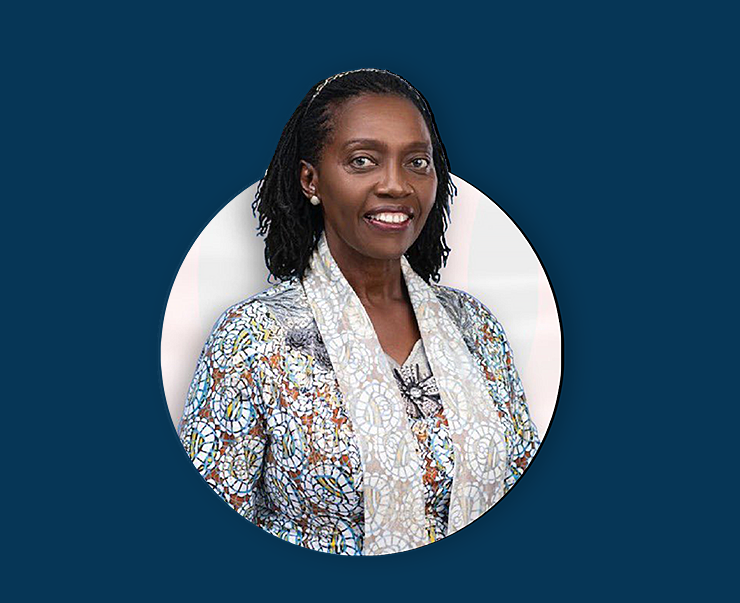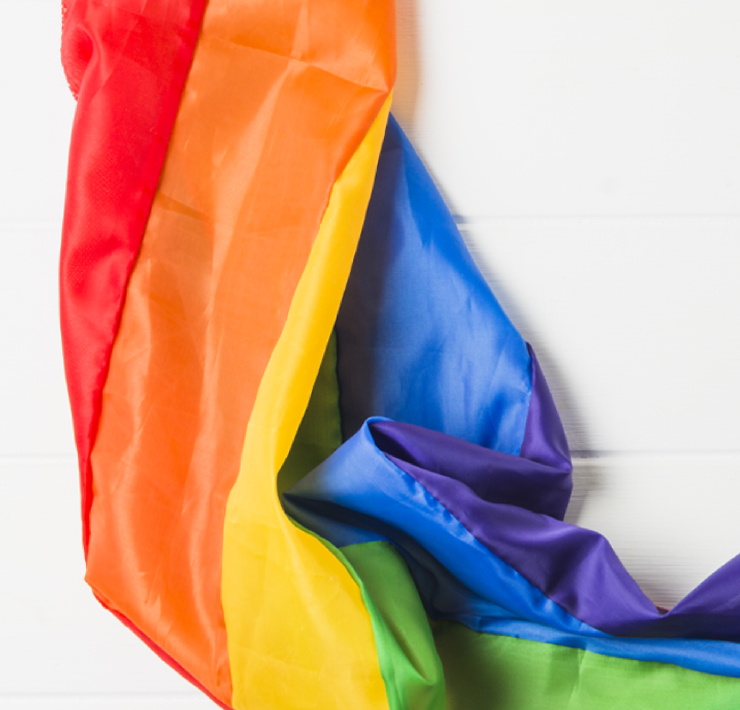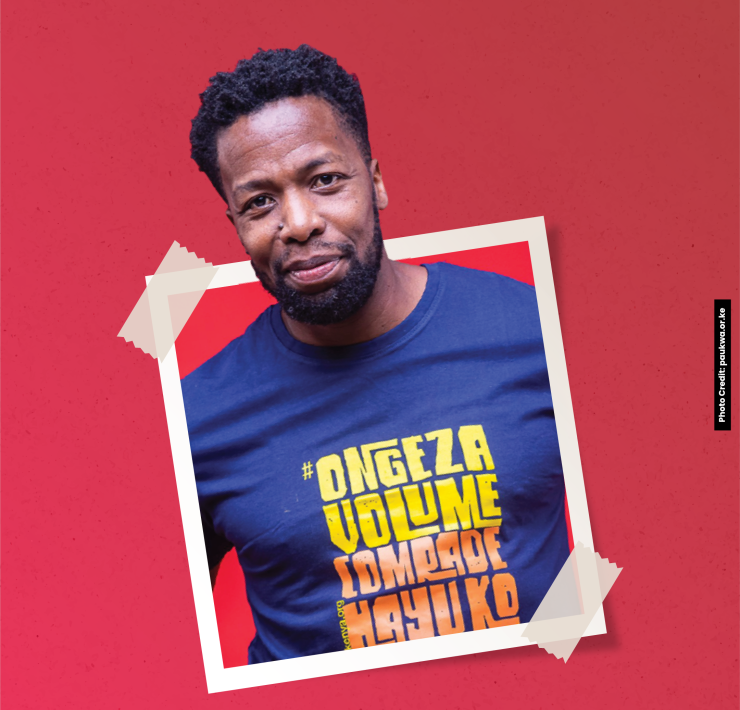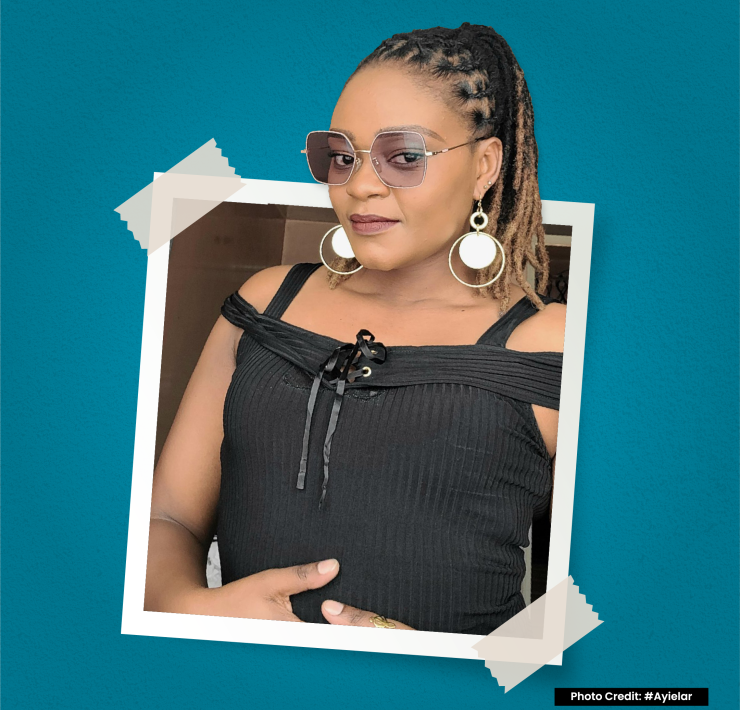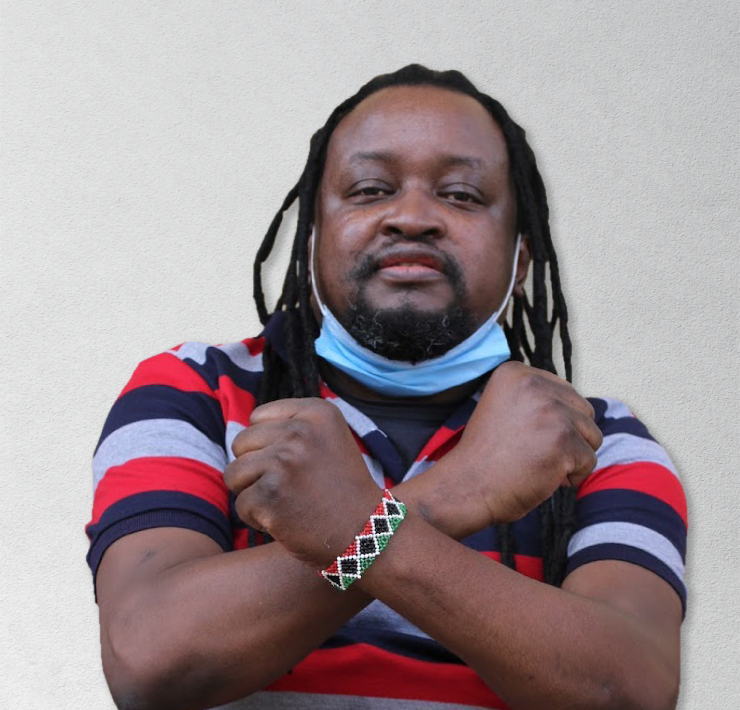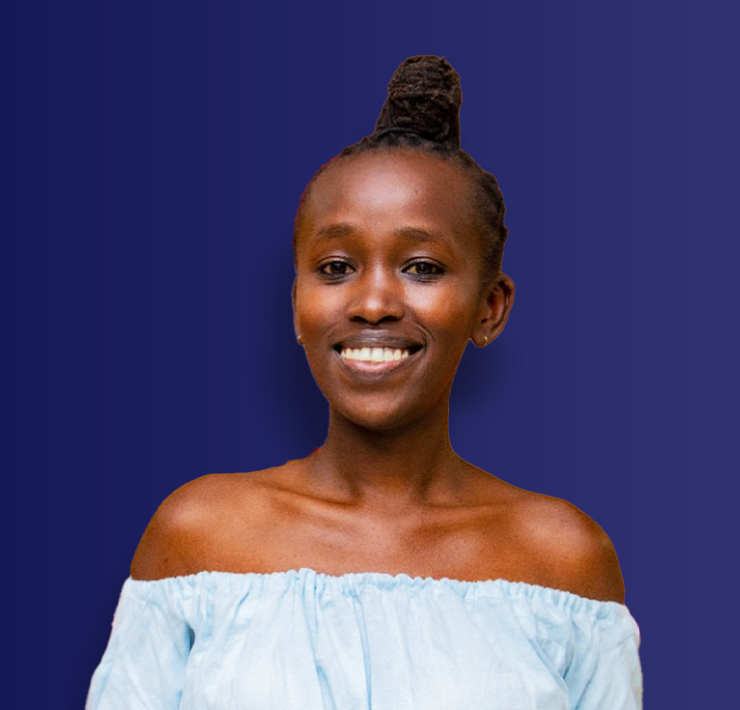This interview is one of a series where CHIA KAYANDA sits down with globally recognized Kenyan artists who have found success away from home yet tend to go rather underrecognized here, in Kenya.
It is 8 p.m. in Nairobi and 6 p.m. in Berlin, where KMRU has been based for the past 3 years as he studies for his MA in Sound Studies and Sonic Arts at the Universität der Künste. KMRU, of course, is not his real name- but it’s not too far from it. Joseph Kamaru, alias KMRU, is a producer, DJ and sound artist charting new paths for experimental ambient musicians worldwide. His albums have been reviewed by global music publications such as Pitchfork, DJ Mag, and Resident Advisor, his artistry covered by The Guardian where he was listed as one of the best new artists for 2021 alongside American rapper Baby Keem and Ghanaian altè songstress Amaarae. KMRU’s music was featured alongside Mos Def and Bobby Womack in the Netflix Documentary ‘Civil: Ben Crump’ (2022), and his hour-long DJ set for Amsterdam Music Festival, Dekmantel, was listed by Mixmag as one of ‘The Best DJ Mixes of The Year 2022’. On Spotify, KMRU’s most played track is ‘Well’ off his 2020 EP ‘Peel’, garnering 252,729 listens at the time of writing this article. Further, KMRU is the only Kenyan to ever share a label with the progressive house icon, Deadmau5 and Dubstep pioneer, Skrillex.
In the span of just 2 years, KMRU has released 7 critically acclaimed projects available for streaming on Apple Music, Spotify and Deezer. Similarly, KMRU has globe-trotted to play far-flung shows from London to Russia, firmly establishing himself as one of Africa’s forefront sound masons in the glitchy textural and ethereal universe of the ambient and the experimental.
Q: A Kenyan making ambient music, that’s hella unexpected. Why did you choose ambient music, or rather, why did ambient music choose you? Have you ever experimented with other genres? I listened to your soundcloud kitambo when you used to make Progressive House. I’m curious about how you switched from experimenting with that to creating more ambient sounds.
When I started production, most of my peers and I had the same idea of EDM: tropical house, techno, all that stuff. That was the phase of production, looking back at those days. There’s just so much information on EDM production and all these EDM festivals for people wanting to make this kind of music. Getting into DJing got me wanting to play house and techno, I even had a phase where I was making Afro-House.
I was still trying music stuff out because I really enjoyed making music, but I also wanted to play. I think it all changed when I was in this residency… East from Nairobi to Kilifi, I don’t know if you’ve heard of it?
Yeah the first one. I had a tiny ipod and we were tasked to create something in the train and I thought “shit, what will I make?” because I just produce. I figured maybe I could record sounds in the train and try and see if I can make tracks from the recordings. I had like a tiny microphone on my earphones and I just recorded the train sounds and stuff. That’s when I met Leon / Manch!ld, I don’t know if you know him?
Q: Debe?
That’s when we met on the train. He was a passenger, not even like a resident or anything. We made tracks based on those recordings, I think it’s somewhere online- it’s called East. That concept of ‘I can just record sounds and like build something off of that’ became a new phase for me, musically. I didn’t know one could just use sounds and it doesn’t necessarily have to be danceable, but just the sounds themselves.
I went into reading about field recording which happened when I bought a Zoom recorder. I needed to buy an audio interface and I figured let me just buy a Zoom because it can also be used as an interface but then I started using it as a mic. It just blew my mind.
Wearing headphones and recording was like the first time you hear yourself sing and you’re like “wow, that’s how I sound?” but that was me with my ears, like ‘this is how much I can hear with this device’.
I was just recording a lot back at home. Rongai is so chill, so calm and so silent but there’s so much sound at the same time. I was just recording a lot, and then using the recordings to make music. I was still making house-y stuff but adding those elements of nature or weird sounds that I’ve recorded into the music and it got to a point when I said ‘okay let me just try and focus on the sounds alone and not the dance elements’ because I wasn’t sure if it was a thing. Even the few DJ sets I played in Nairobi, I was trying to see if people can just listen and not dance.
In 2017/2018, I was invited to Berlin for a residency and that was when I realized I’m actually doing the wrong thing because there’s like a lot more weirder people here. So in 2019, I decided, ‘okay I’m just going to focus on this experimental ambient field-recording world and see how it goes’ and just play with recordings and use it in my music.
At the same time, reading a lot on discourses about sound. That’s actually why I moved to Berlin for my Masters. I was still in school at Kenyatta University and I figured that maybe I could finish my course and apply for a masters because I wanted to learn more about sound. It’s been a journey, I’m finishing my masters this year and I’m about to write my paper. I’m just thinking a lot about everything to do with sound, and about home, and how all this has collaged itself, and how my music has changed.
Q: How long have you been doing your masters for?
Three years. My masters is a 3-year master and I’m in my final year, I finish in July.
Q: Sorry if you haven’t thought about it yet, but what’s the title for the paper you’re writing?
I’m about to write it, like right now. I don’t have a clear title but its connected to time. It’s also related to sound and music because the music that I make feels like there’s no time or time is so stretched- there’s that element of sound that can make time feel short or experienced in long durational form, that’s on the practice side.
On the theory side, it’s more to do with time and space because when I go back to Nairobi, there’s usually a different rhythm that I feel, and how time feels there. Like the Maasais, who move and roam around the city against the direction of the cars, and they just stop time so there’s a lot about theories that I’m reading about and trying to connect to that. It’s so different from here where things are very linear and structured and scheduled. That’s just one topic, the other one is on listening.
Q: That sounds really cool, I can’t wait to read it when you’re done with it. I do hope you pass.
Yeah I have to pass.
Q: How do you know what to record? Do you just move around with your field recorder in case you stumble upon a sound by chance? Or are you more intentional about it like “today, I’m going to the forest to record the sound of these birds”?
Initially, it was random. I usually carried my recorder in a tote bag and sometimes I think, ‘maybe i should record this’. I felt it wasn’t very intentional, I was just recording a lot which was nice because I got to hear so much and I was very attuned to where I was. Over time, I became conscious of what I’m recording and why and where, so it’s very intentional when I decide to hit record. I realized that we’re constantly listening or recording in a way because of the particular way we remember sound. I did some projects in Magadi, in Kibera, in some places in Uganda, and they’re places where I’d usually want to go back and listen to what has changed over time and just be conscious of the space that I’m recording, and the people in that space.
Even if I’m close to the people, there usually has to be an invitation where it feels right to record. Over here in Europe, it was very hard to change how I felt when I was recording because sometimes you don’t feel comfortable enough to record within a space to record. I became quite intentional when I’d go to a space for so long and get used to it or familiarise myself with it and then record, but sometimes things just happen like I forget my SD card and I’m like “fuck, maybe I was supposed to record” or things like that, so at the moment its quite focused. Sometimes I have an idea for a project and I’m gonna record all the weird noises in the house or the door sounds. Something like that is very focused like “I’m gonna record this and I’m gonna make a project based on wind, kitu kaa hio.
Q: Have any of your projects been something you made because of wind?
No, but I have wind sounds.
Q: What else is in your tool box? What kind of gear do you use to make and manipulate sound, and produce the music you make?
The world of microphones is so big. It’s so broad that you can record a voice, but there’s also other stuff you can record outside the voice. So just a recorder, a normal one, which you can record sounds on, and then I have this mic which can record electromagnetic sounds, it’s a really tiny one.
Q: What’s the brand?
It’s called SOMA. It’s just a tiny device by a Russian company and it has these two antennas. You know how when your phone is near a radio, there’s this sound the radio makes or picks up? So it picks up anything making these weird noises. I was experimenting with this mic especially during COVID because I was home a lot and I was like ‘I’m sure there’s so many sounds in this house’ back in nairobi.
Then I have this mic that can record underwater. It’s called a hydrophone, it’s the kind of microphones used by scientists but I try to use it creatively, recording sounds of rivers and trying to make music from that.
And then contact mics. The ones you put on surfaces and you can record surfaces when you tap on them. You remember the success cards for KCPE and how they had like that ka-round thing?
Q: Yeah, the singing cards?
Yeah, that ka-round thing is also a microphone actually.
Q: Really?
I didn’t know that’s what these microphones are made from until recently. Funny thing, all speakers can be microphones and all microphones can be speakers.
One last one that I haven’t used is one that records vibrations on the ground, it’s really low end. This is mostly the recording side of things when I’m like “I need to start a new project on sounds of water and underwater sounds” and then when I come back to Ableton, I’m either processing them or just using them as raw as possible because sometimes when I record things I figure “maybe it doesn’t need to be edited, it can just stay as it is.”
Q: Tell me about your 2022 project, Epoch. What was happening in your life when you recorded that and what were the feelings that inspired it?
Last year was intense. I was traveling a lot and I also realized I wasn’t having enough time to make music because I wasn’t home for more than two weeks without having to leave again. Epoch was when I knew that I wanted to make music, just to slow down the pace of things.
I had so many shows and I was constantly on the move but 2022 was just the year where I felt so grounded with what was happening for me musically. I wanted to make music just to pace things down because things felt like they were moving so fast. In June, I locked the whole month and I was like “okay, I’m gonna make music just for me to like, slow down, and listen to on these travels” and it just seamlessly finished itself. It felt like it happened so quickly that I wasn’t sure it was done, but I really enjoyed the process of making it.
Q: How do you compare Epoch to another project, say Limen? How far apart were the two projects? Because you released them both in 2022, and what would you say the differences and similarities between them are?
So Limen is a project with a close collaborator of mine. He’s called Aho Ssan and he’s from Ivory Coast but he lives in Paris. We worked together a lot on different projects and this was the first one where we were like “okay, lets share this.” Limen began a year or two ago, on a project we showcased at an exhibition, one of the tracks was part of it and then we were like “let’s make more tracks in this same world”.
Aho Ssan’s music is very intense. It’s very physical and embodied and we were like “let’s make something intense”, and those three tracks were just a glimpse of something. Limen is a threshold and we wanted to see if it’s possible to reach a threshold of sound that’s intense but at the same time emotionally driven.
I knew I was going to make a record for sale for this label. It would be my second release with them and I knew I wanted to make something slow and soothing, and last year felt like the best time because of the heavy touring. There isn’t much of a similarity between the two projects; Epoch is an event of time happening at a given time, I made it specifically based on the situations that were happening: heavy touring, not being home, and wanting to make music, whereas Limen was a very focused concept of sound.
Q: What does Limen mean?
The word ‘Limen’ came from a book I was reading about electro-magnetic sound. Limen means a threshold below which a stimulus is not perceived or distinguished. It’s like this line where things are very subliminal, so we thought about it from a sound point of view. How something can be so intense but it’s not bursting. It’s just on the tip of things.
Q: You mentioned a label, what label is that? Are you signed to any labels now?
The label is called Subtext and it’s Berlin based. It’s the label which Aho Ssan releases on. I’m not particularly signed to a label. When I was trying to get into music, I was doing so much research on labels and how these [industry] things work, and trying to reach out to so many labels and none of them were getting back so I figured, “okay im just gonna do this on my own” and self-release stuff.
I’ve always not wanted to be claimed or owned by one specific label so I try to be fluid where I’m free in a way- because there’s a whole other world of music where artists get exploited a lot.
Q: I’m sure every project is different. From what you mentioned, I’m guessing Epoch took you about a month to record?
It took longer actually. I started it in February and finished it in June.
Q: Is that generally how long it takes you to finish a project? Or does it go depending on the project?
I think it depends on the project. Sometimes it’s very quick, like a week if I’m focused and say, I try to make 3 or 4 tracks in a week for a short EP and finish it.
With other projects, sometimes when I start making music I’m not even thinking about it in a formal collage project, but there’s days where I make a track and I’m like “oh, this is going to be part of an album” and then work on that.
Other times I’m like “okay, I’m gonna work on an album” and I’ll open a project and I know ‘this is gonna be the first track’, or most times, I’ll write the tracklist or just the names of track in no order before making the album, and that’s how Epoch was done.
Q: How receptive do you feel Kenya, and Nairobi specifically, is receptive to ambient music, compared to Berlin and the rest of the world? And from the last time you came here, do you think anything is changing regarding how receptive people are becoming to ambient music?
In 2018, when I was in Nairobi and making the music that I was making- experimental / ambient- I was aware that it was a bit different from what people are used to, mostly in a club or performance context. It was a bit vulnerable playing shows.
I had a show I played in Nairobi, at The Alchemist, and I was almost taken off the stage. It was part of a residency which was nice and varied: it was me playing, Slikback, Jinku, Karun, a guy from the US called Flexfab, and they were nice curations so everyone could just play their own stuff. They wanted me to play last but I insisted on playing first because I just knew. I started playing and the owner was like “what’s happening? It’s just sounds and we want music”.
Slikback was telling me there was so much movement on the ground because people were confused about the weird noises coming from sounds. I usually like those situations where you make people aware, and it’s a bit confusing to them initially. Back then I’d have to convince myself and be like “Okay im gonna do this” when I played in shows. The first times I played I’d be so nervous because you know what you’re offering and it’s different but you still want to. 2019 was when I decided that I’m just gonna do this and I won’t care so much because this is what I want to offer.
Being in Berlin was so different. I play so many shows and everyone loves my music, it’s different from home so there’s a definitely weird contrast. Here, I play shows and it’s mostly white people, but I want more black people to experience the music this way. I think it’s changed a lot. Like this time, when I played in Kilifi and at The Mist, a lot more people were open to it and liking it.
Or maybe it’s because I’ve built my confidence. I’d find myself wishing that it was like that when I was starting out. It just felt nice. Different music, communities, and people. Being able to listen and seeing people listening was so impressive to me. It made me happy.
Q: You know how in this modern age of DJ-ing and playing out, the goal of the DJ is to make people dance and have a good time, or something along those lines. What feeling are you trying to evoke in the listener with the music you make and the sets you play?
Sometimes it’s very intentional. It’s not like I want people to go into a state, but it happens to me when I play where I’m just losing time and being reflective. You know how you can dance intensely and get into a state? You can also do this through just listening and being still in a given point.
Most times I think people need to be listening and the best way to listen is to just sit down and listen to the music this way, so I try to do this with the 45-minutes to 1 hour I usually have to perform.
Q: What’s one location that surprised you the most by being unexpectedly receptive to your music?
It goes back to this show I played even before I moved to Berlin. I went to St. Petersburg, Russia for a show and they slotted me after this famous guy. He’s a DJ called Surgeon and he has this famous project called Anthony Child. It was like being slotted after the main act and people don’t know me. I was so tense and asking myself why they slotted me after this guy. Then he played his show and I was like “fuck mine is not as good as his”. But I’ve never gotten so much love from a crowd as I did during that experience because I was like “I’m just gonna play what I prepared” and I played and there was just so much love from everyone, I even thought to myself, “is this real?”
I think since then my performance confidence just went up so when I play shows, small or big, despite the scale of the venue- I’ll say, “remember that day you were so nervous and you just got all this love? You just play you.”, i.e:- cheza kama wewe.
Also just being honest with myself about what I want to play. I think people usually know, feel or see when the artist is just being genuine with what they’re doing.


